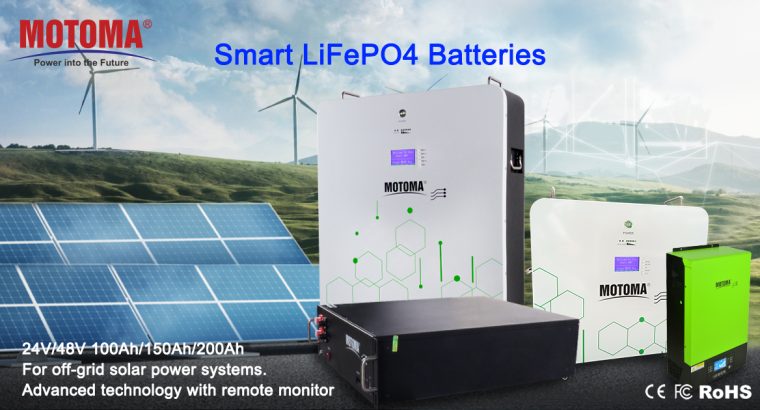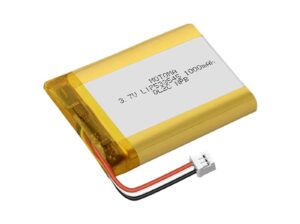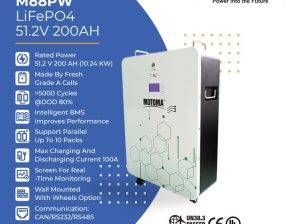lithium ion Solar Battery Advantages
Lithium ion solar batteries are a new type of battery that can store energy generated from solar panels. They are becoming increasingly popular due to their ability to store large amounts of energy and provide a reliable power source when the sun isn’t shining. But what is a lithium-ion solar battery, and how does it work? This blog post will take an in-depth look at the technology behind these incredible batteries and discuss why they have become so important for powering homes and businesses worldwide. So read on to learn more about this amazing innovation in renewable energy!
What is a lithium ion solar battery?
Lithium ion batteries are rechargeable batteries that have become increasingly popular in recent years due to their high energy density and low self-discharge rate. Solar batteries are a sub-type of lithium ion batteries that are specifically designed for use with solar panels.
Solar batteries typically have a higher capacity than standard lithium ion batteries, as they need to store enough energy to power a home or business during a power outage. Solar batteries can either be integrated into the solar panel system or they can be purchased separately. Some solar panel systems will have a built-in battery, while others require a separate one.
When choosing a solar battery, it is important to consider the warranty and lifespan of the battery. Some solar batteries may only last for a few years, while others may last up to 10 years or more. It is also important to consider the temperature range that the battery can operate in, as some batteries may not work well in extreme cold or heat.
How do lithium ion solar batteries work?
Solar batteries are rechargeable batteries that use solar energy to charge their cells. Solar batteries are made up of two types of material: an anode and a cathode. The anode is made up of lithium, and the cathode is made up of a metal oxide. When the sun hits the solar cells, it causes the electrons in the anode to flow to the cathode. This creates an electric current that can be used to power devices. Solar batteries can be used to power everything from cell phones to cars.
Advantages
- Lithium ion solar batteries are more efficient than other solar batteries, which can store more energy and release it more slowly over time.
- They also have a longer lifespan than other solar batteries, meaning you won’t have to replace them as often.
- Lithium ion solar batteries are also less likely to experience the “memory effect,” meaning they won’t lose their capacity to hold a charge over time as other batteries can.
Disadvantages
- They are more expensive than lead-acid batteries.
- They require a higher initial investment.
- They require more maintenance than lead-acid batteries.
- They have a shorter lifespan than lead-acid batteries.
- They are not as durable as lead-acid batteries and can be damaged by heat or cold weather.
How to choose the right lithium ion solar battery
Choosing the right lithium ion solar battery for your home or business can be daunting. There are many factors to consider, such as power needs, budget, and maintenance. This guide will help you sort through the options and make the best choice for your needs.
When considering a lithium ion solar battery, you first need to determine how much power you will need. Solar batteries come in various sizes and capacities, so you’ll need to know your power needs before purchasing. Consider the size of your home or business, the number of occupants, and daily power usage.
Once you know how much power you need, you can look at specific battery models. There are many different brands and types of lithium ion solar batteries on the market, so it’s important to research them before making a purchase. Read online reviews and compare prices to find the best deal.
Finally, consider maintenance when choosing a lithium ion solar battery. Some batteries require more upkeep, so factor that into your decision. Choose a battery that is easy to maintain and will provide long-term reliability.
Conclusion
Lithium ion solar batteries are an excellent choice for investing in reliable and safe energy storage technology. They offer higher efficiency than most other battery technologies, while being lightweight and easy to maintain. Additionally, they provide great value for money compared to traditional lead-acid or NiCad batteries. With the right maintenance, these lithium ion solar batteries can last several years before needing to be replaced. Investing in one of these fantastic products will help you save on energy bills and make your home more eco-friendly!
Comments (17)
You must be logged in to post a comment.




[…] of the main advantages of LiPo batteries is their high energy density. This means that LiPo batteries are able to store more energy in a […]
[…] spite of these potential environmental risks, LiPo batteries offer a number of advantages that can help to reduce their environmental impact. For example, LiPo batteries are much lighter […]
[…] second type of car battery is the lithium-ion battery. This type of battery is increasingly popular due to its high energy density, meaning it can store […]
[…] on, solar street lighting technology began to rely on more advanced, efficient batteries such as lithium-ion batteries. This allowed for the improved storage capacity of the batteries, allowing for longer periods of […]
[…] rapid growth in renewable energy sources such as wind and solar power has led to the development of an increasingly sophisticated battery energy storage system (BESS) […]
[…] most obvious advantage of solar energy is that it is a renewable resource. Unlike traditional sources of energy, such as fossil […]
[…] Cobalt Oxide (LCO) is a type of Lithium-ion (Li-ion) battery that is widely used in portable electronics, electric vehicles, and other […]
[…] high safety, as they are less prone to thermal runaway and other safety issues compared to other Lithium-ion battery chemistries. This makes them a good choice for applications that require high safety standards, […]
[…] Lithium-Ion (Li-ion) Battery: Lithium-ion batteries are one of the most popular types of high drain batteries. They have a high energy density and are capable of delivering a high current output. They are commonly used in digital cameras, laptops, and power tools. […]
[…] of the key advantages of IMR batteries is their safety. Unlike other types of batteries, IMR batteries have a safer chemistry and are less […]
[…] Tesla 4680 battery is a new type of lithium-ion battery cell that was announced by Tesla in September 2020. This battery cell has a diameter of 46mm and a length […]
[…] is made up of a mixture of lithium salts and organic solvents. When the battery is charging, the lithium ions move from the negative electrodes to the positive electrodes. When the battery is discharging, the […]
[…] advantage of LiFePO4 batteries is their long life. LiFePO4 batteries typically have a life span of 3000-6000 charge cycles, which […]
[…] Lithium-ion batteries are becoming increasingly popular due to their high energy density, low self-discharge rate, and long cycle life. They are lightweight and do not produce corrosive gases during charging. However, they are expensive and can be dangerous if mishandled, as they can catch fire or explode. […]
[…] are rechargeable batteries that use lithium ions as the primary charge carrier. During charging, lithium ions move from the cathode to the anode, and during discharging, they move from the anode to the […]
[…] cathode is made of a metal oxide such as cobalt, nickel, or manganese. When the battery is charged, lithium ions are released from the cathode and move through an electrolyte to the anode, where they are stored. […]
[…] use in applications that require high power and long runtimes. In this article, we will explore the advantages of LiPo batteries and some of their […]